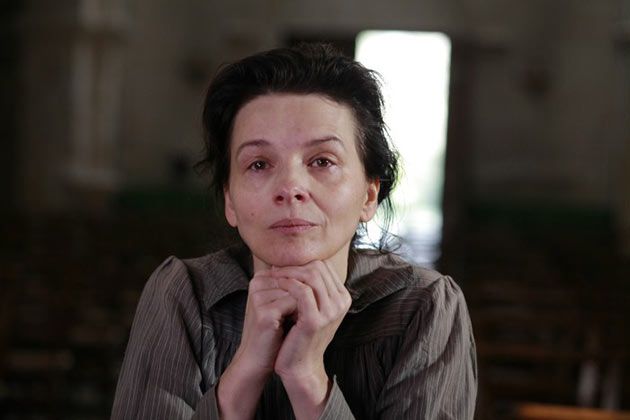
With each new film, a controversial French filmmaker Bruno Dumont continues to fascinate me. His fixation with purity is quite unflinching, and his characters suffer for (or for the lack of) it. Camille Claudel 1915, an even more characteristically stripped-down, austere Dumont film, concerns 3 days in the life of Camille Claudel, a famed sculptress and one time August Rodin's mistress. She has been abandoned and committed by her family to a mental asylum where she would spend the rest of her life until death. Her younger brother Paul, a famous poet and writer with a strong Christian bent visits her during this time, not to rescue her, but to chastise her.
Juliette Binoche, who continues to choose intriguing projects as she gets older, plays the unglamorous title role and giving a measured and beautiful performance of a woman (slightly) under the influence. From what I hear, the famed actress reached out to Dumont because she wanted to work with the director and challenge herself. She wanted to play a woman in a confined space. Camille Claudel 1915 is the result of their collaboration.
So this is quite the rare film where Dumont uses a famous actor (other than the late Katerina Golubeva in Twentynine Palms back in 2003, which I feel was the only misstep in his otherwise singular filmography). In a true Bressonian fashion, he usually populate his films with non-actors. In this film, he mainly focuses on Binoche's non-made up, anguished, hollow face as she spends her days in boredom and frustration surrounded by other mental patients.
It starts with Camille preparing her meal alone in the kitchen- a couple of boiled potatoes. A greenhorn intern who is not familiar with Camille's arrangement tries to stop her only to be the victim of her outbursts. A seasoned nurse quietly informs him that Camille is allowed to prepare her own meals because of her 'condition' that she thinks someone is trying to poison her. Tearful Camille joins the rest of the group at the dining table. It's a group of sad creatures- a toothless, drooling, howling bunch of real mental patients.
For naturalism and fluidity, Dumont and the crew shot the film during the daily routine of the mental hospital (where the film was shot): real patients going about their daily schedule and real nurses playing Sisters of the old Catholic mental asylum. The result is quite astounding. I can assure you that the controversy surrounding using real mental patients in film, that the film is exploitative is quite unfounded. Dumont has proven over the years that what he strives for in his filmmaking is showing purity and authenticity in both physical and spiritual form.
The sibling's differences are portrayed in two nearly identical, long, technically daring scenes: with the other patients in tow, Camille and the Sisters climb a rocky hill. Preoccupied but not unhelpful or uncaring, Camille assists others who are much more handicapped than her to reach the top of the hill. It's a beautiful site. But it's just a hill. As soon as they reach it, they go back down. The afternoon walk is over. Then there is Paul (Jean-Luc Vincent)'s long walk up to a hill behind a church with a friend who is an ordained priest. On the way to the top, Paul describes his first religious epiphany in detail to his friend, his story coming to a crescendo at the peak.
The only time we see Camille smile is when the news of her brother Paul's visit is announced. She is fully expecting to be freed from her unjust confinement. She might be a little paranoid, but she is still a sentient, sensible thinking being. When they meet, he lectures her why she is in her state of misfortune. He deems that it is her arrogance which is prevalent in artistically talented types that gave way to her delusions of grandeur. In his mind, God loves everyone but punishes those who are insolent. It's an unforgivable sin.
Dumont always grapples with the idea of purity of faith in his films. It can be devastating (Humanité). It can be beautiful (Hadewijch, Hors Satan). In Camille Claudel 1915, he examines this purity in a historical context in the lives of historical figures.
Camille Claudel was a tragic figure, not because she was punished by God. She was as much a victim of her paranoia as of the sexist society and its times. As Dumont throws Paul's view in, the film becomes another contemplation of the purity of faith which can be quite rigid, inhumane and self-righteous.
All the controversy aside, the film remains to be beautiful in its austerity. It's a hard film to watch but a very strong one, one that will definitely ring over your head long after you leave the theater.
Camille Claudel 1915 has an exclusive two-week theatrical run at Film Forum, starting October 16. It's distributed by Kino Lorber. For tickets please go to Film Forum website.